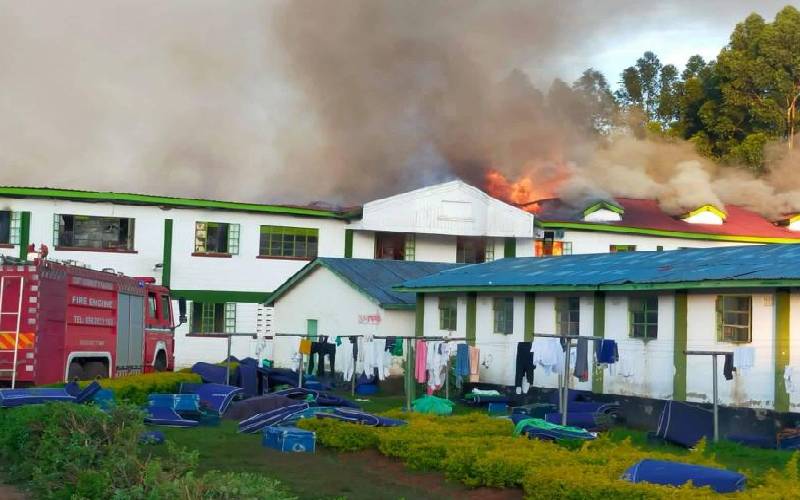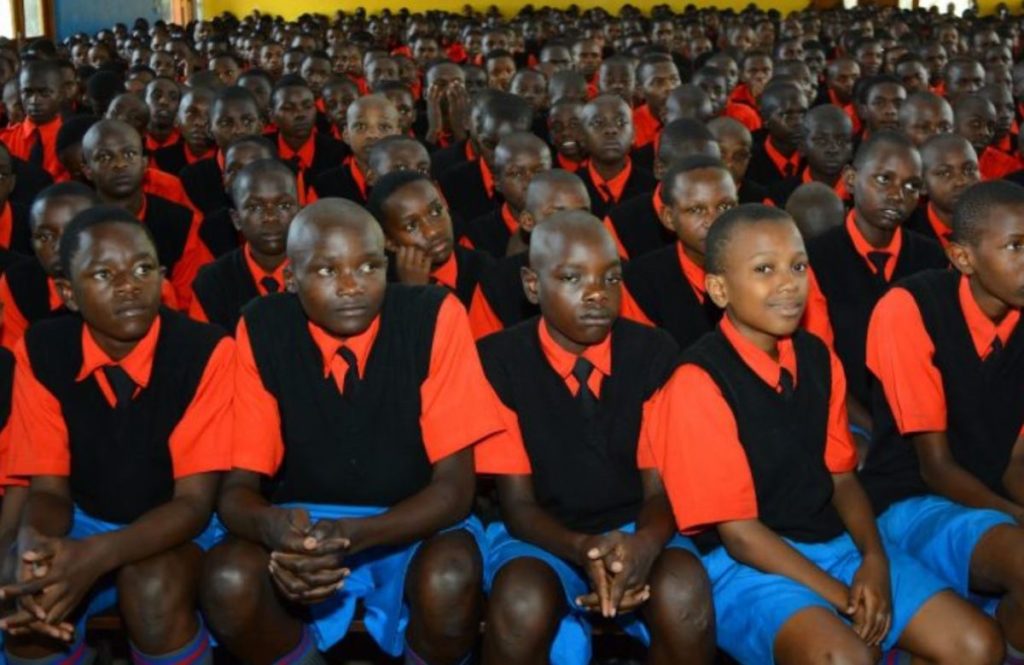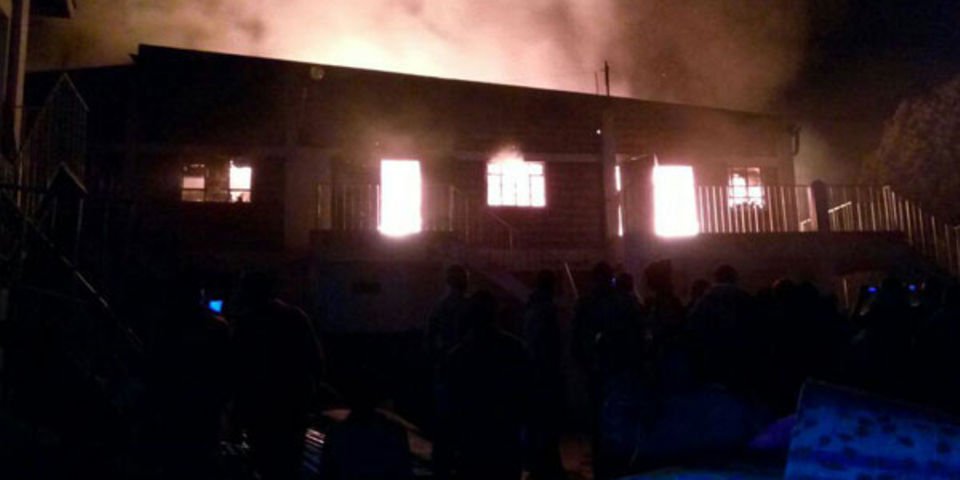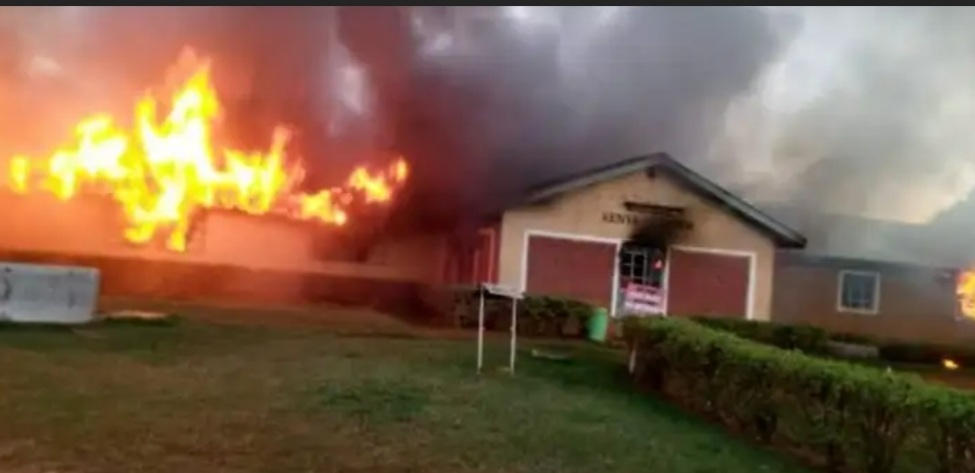Kenya is witnessing yet another wave of schools unrest. Just this term alone, more than 31 learning institutions have been burnt down, with classrooms, laboratories and dormitories destroyed and a number of learners left injured.
What is going on with our students? And why are they burning down schools to begin with? What could be fueling the current spike of school unrest? Well, these are just some of the questions that need answers and soon, in order to resolve the wave of school unrest and loss of property across the county.
As we try to understand the causes of fire in schools, it is important to note that Kenya has had a long history of school fires, especially in secondary schools, which most happen to be boys’ school according to statistics.
However, the recent increase in fires in schools has raised great alarm to all the education stakeholders, from the government, parents to students themselves. Who is to blame or held accountable for these fires? Is it just a case of students, boys and girls, showing unruly behavior?
We are going to look deeper into the cause of fires in Kenyan schools, why the unrest and how the education stakeholders can work together to finding a lasting solution to this perennial school fires.
Factors Influencing School Unrest and Unruly Behavior in Students
1. Exam Pressure with NO Venting Space
Cited as one of the main reasons why students feel under pressure in schools, most of us can relate with the anxiousness that comes with having to prepare for exams. Considering what 2020 came with, Covid-19, school syllabus had to change after a long break.
But then again, students going back to school under the new normal it’s something most were not prepared for. The long pandemic did have a considerable effect on students’ attitude towards learning. Some even opted to discontinue schooling.
In schools, many students have reported feeling overwhelmed by the speed in which they need to cover the syllabus, while extra curriculum activities like sports, drama and music have been eliminated from the program.
These activities are quite important to student’s lives. It is their creative channels to vent of youthful energy innovatively and constructively while in school.

Adding that to a crushed program and exams at the end of the term, understandably, students are bound to experience some pressure. This, however, does not justify the unrest and unruly behavior that have rocked the country. Yes, it does try to explain why they feel overwhelmed.
Panicking over exams and thinking they are never ready is something they will experience for a long time – at least until they’re done with school.
Perhaps it is an issue of poor exam preparation. So to avoid sitting for them, they choose to burn down schools. Thinking it is a solution but it only interrupts an already tight syllabus making it even worse for themselves.
Exams will done and teachers will try to cover as much as they can to finish the syllabus. I think what students can do is – to find right channels to express their frustrations and develop effective study methods that will help prepare for examinations.
2. Poor Communication Causes Misunderstandings
Students have previously complained about school management not listening to their requests and grievances. A good example is Ortum High School located in West Pokot County, where students torched the school after the school headteacher was transferred unexpectedly.
In another instance that happened to a boy’s school in 2018. Students burned down school structure and properties just because the administration denied them the pleasure of watching 2018 FIFA world cup match.
Having interacted with a number of teenagers over the short mid-term break, and just trying to understand their concerns. It’s evident that there seem to be misunderstanding and miscommunication between students and the administration.
Some students have protested about not being involved in key decisions that directly affects them. The example of Ortum High School, students felt they needed to have a say in the transfer of their headteacher.
Whether it is an issue of them feeling entitled in the matter or finding fault in the process, proper communication and perhaps some kind of involvement would have cooled their tempers.
To ensure mutual understanding between students and administration, effective communication has to be present. And because it’s a two-way interaction, students and their respective leaders should find ways in which they are able to express their concerns and requests without intimidation.

3. Drug & Alcohol Abuse: Ticking Time Bomb in Schools
Parents’ true happiness comes from seeing their children succeed. That is why they deny themselves a lot just to see their loved ones get good education and later become successful in life. However, the situation in most of these schools paints a different picture.
What used to be a safe haven for students is now destination for drugs such as bhang.
Students are exposed such drugs and because peer influence is at play, most succumb to the pressure and start using it. Drugs impairs one’s ability to think and make rational decisions. Eventually, the students will be unable to cope with the pressure of finishing syllabus and examinations thus resulting to burning down schools just to avoid the reality they created for themselves.
Simple rules become hard to follow and rebellion kicks in among students. They begin to express unruly behaviors and choosing violence. This is exactly what we see across our institutions, not just High Schools but also in Universities. Some of the students who start these fires are under the influence of drugs.
Indiscipline is an issue, but drugs in schools is a completely new threat to deal with. Education stakeholders must look into this problem before it takes root and form a culture in schools. Students must be sensitized on the effects of drugs, and anyone found selling drugs, not just to students, face the just hands of the law.
If policies can be put in place to support this war against drugs in schools, then learning institutions especially High Schools can consider testing students against different substance abuse. This will help catch those using drugs before they can influence others into making decisions.
4. Banning of Corporal Punishments Was the Worst Mistake
For us who went through a school system that believed in correcting by punishing, we can confirm that instant punishment produced instant discipline. Any slight case of indiscipline would have been dealt with thoroughly to serve as a warning to others, and a good reminder not to repeat the mistake again.
But since corporal punishment was abolished in Kenyan schools, many students have developed wrong-sense of entitlement that they can do anything and left unpunished. They exhibit chaotic behaviors and bad attitude towards their teachers, administration and learning in general.
The well-worn saying “Spare the rod, spoil the child” couldn’t be more applicable here. Students should be aware of the consequences of their choices. If they chose to disobey school rules, even after been told several times, they should be ready to face whatever punishments that comes with it. Otherwise, leaving mistakes and wrongdoings unpunished will create a culture of rebellion.
But it is also important to note the limitations of traditional methods of handling teenagers. Punishing students is not enough if it only stops at that. Overtime, some will get used to beatings and still not submit to the rules.
If corporal punishment is combined with counselling, then it would be easy to help students see their bad behavior and pursue to be better.

5. Social decadence in an Ignorant Society
We could be sitting here blaming students for causing unrest and burning down schools. But isn’t this a reflection of the society we live in? A society made of people with compromised values and questionable characters.
Unfortunately, this is exactly the same breed of individuals we have as students. People who are not willing to submit to rules and regulations nor show concern to issues that does not affect them directly. A good scenario portraying just how much social decadence has prevailed is where students buy drugs, alcohol and even petrol from people around the school area.
The member of the public don’t question or gets disturbed by the fact that it’s a student in a school purchasing drugs or petrol. This ignorance from members of the public is enabling the bad behavior. It becomes easy for students to misbehave and blend in with the rest of people outside, as it is the norm out here.
We need to find our morals as a society and inspire a generation of responsible people. It starts with you and me – right from family setup, to instill character in teenagers in their critical stage of life.
Parents also need to take initiative to guide and mentor their children. Cited as another cause of fires in Kenyan schools, indiscipline in students can be traced back to their homes.
A child that lacks proper parental guidance such that they are allowed to do what they please, tend to exhibit a rebellious attitude at school. They expect special treatment and anything availed to them upon asking. That is not how things works in real world.
Students need to be patient, cultivate resilience and build strong mental frame to deal with an unfair world – full of opportunities- that is awaiting them. Let us Trust the Process Folks!
6. Internal Conflicts between Prefects and Students
When there is misunderstanding between school administration and students, school prefects find themselves on the receiving end. In one instance in Nyeri High School, four prefects lost their lives after students locked them in a dormitory and set it ablaze. Sad.
School prefects are there to serve students and the administration in ensuring smooth flow of communication. They are the ones who forward students complains and demands to the school management, and any update or information is relayed back to students through them.
Their role is quite important in ensuring proper learning environment even though some tend to overstep their responsibilities. But the same students being served feel harassed and complain about unfair treatment. The four students didn’t deserve to die, and what happened to them was totally unacceptable.
Student should learn to respect authority. They are the ones who choose their prefects and that should be enough to trust their leadership. Without them, certainly, a lot can go wrong

7. Political influence: Playing Politics with Student Future
Politics plays a crucial role in our society and it affects every sector our lives. Previously, politicians have tried to interfere with the running of schools trying to dictate the management. One good example is in the case of government transferring teachers.
Therefore, when students feel like the transfer was unfair — in support or against the politician’s decision – they opt for chaotic behaviors and torching their school just to make a statement.
The government should enforce a stun warning to anyone politicizing school management to avoid inciting students.
Takeaways
We have looked at what we consider key causes of school unrest, based on opinions from students, teachers, parents, and government officials. These stakeholders can work together to achieve lasting solutions in ending the unrest.
Some of the measures under considerations to reduce school fires include:
- Introduce mentorship classes for students to learn character development
- Schools be on fore front in the fight against drug abuse.
- Education and sensitization programs on the effects of drug abuse.
- Learning effective study methods and preparation of exams
- Continuous dialogue by the education stakeholder
Hey there! Thank you for taking time to read this article. We kindly welcome your opinions on what we can do as individuals or collectively to deal with school unrest in Kenya